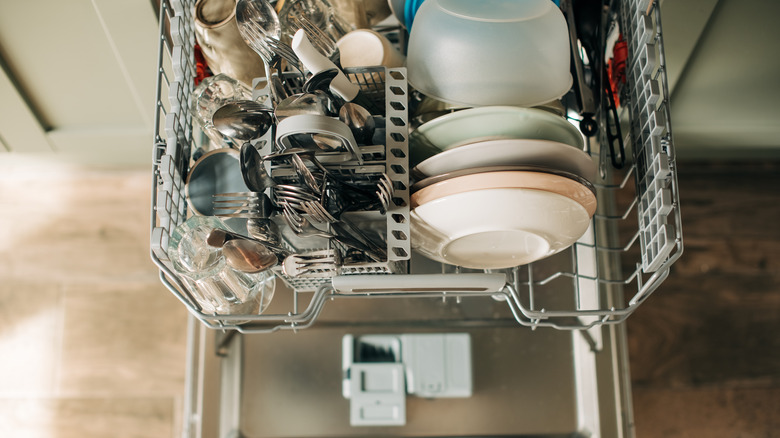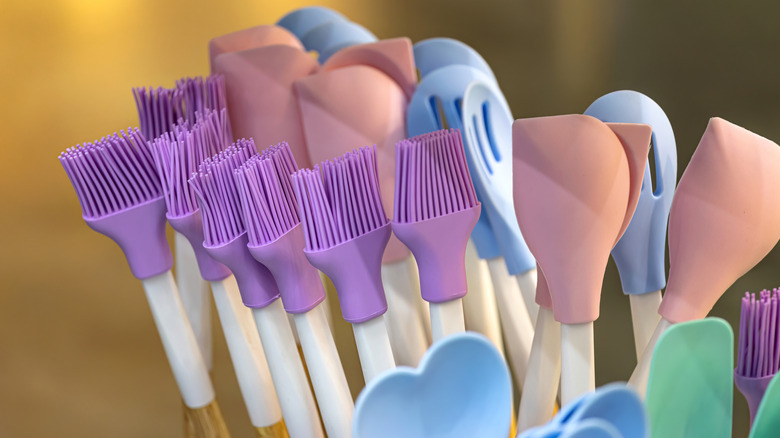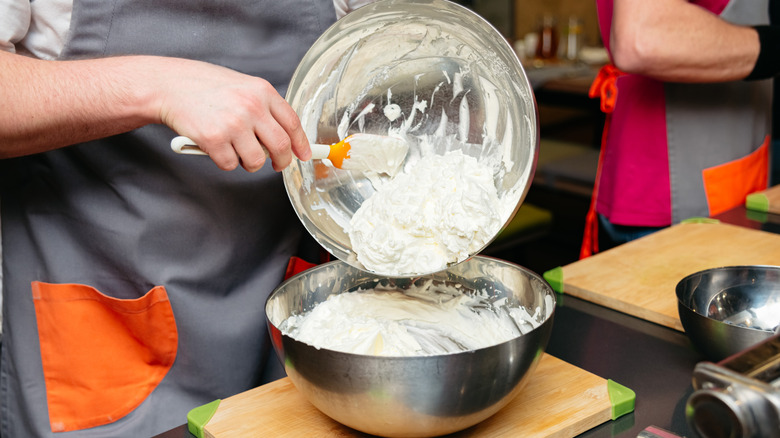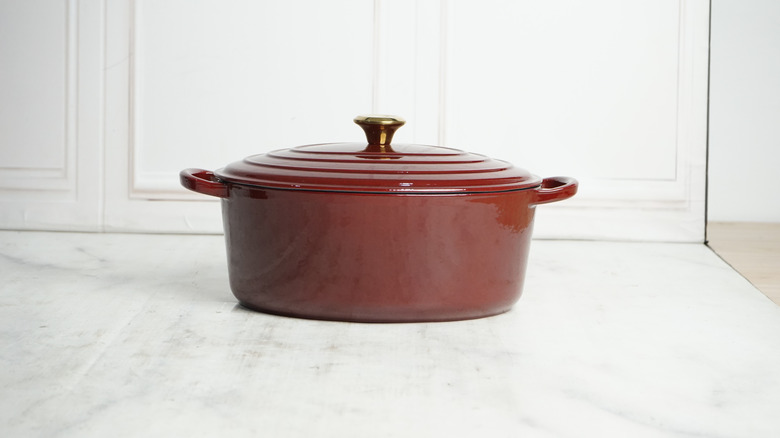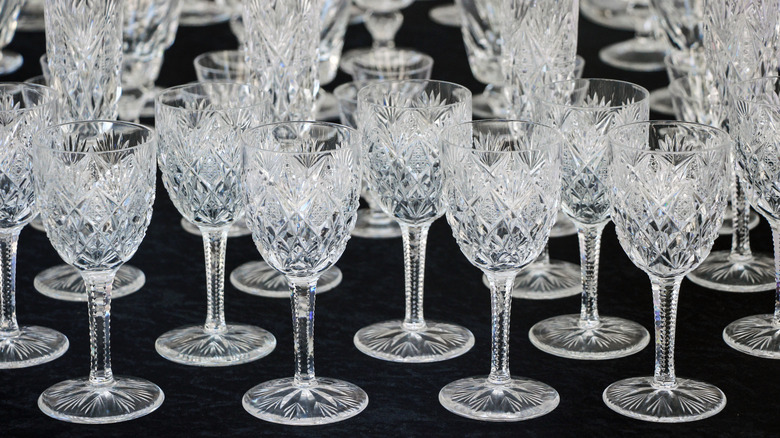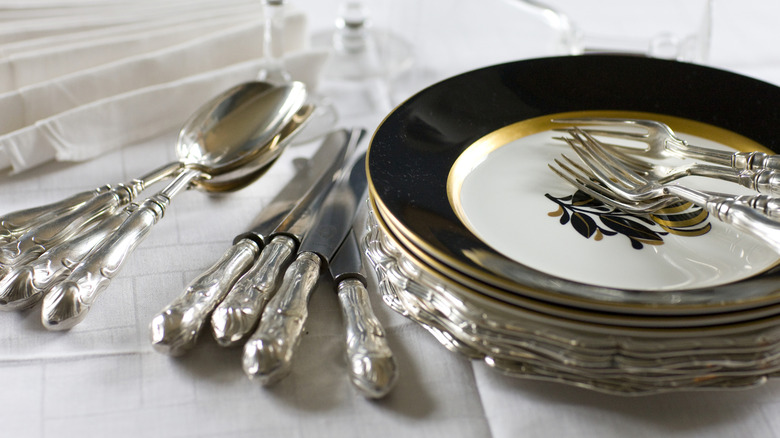5 Kitchen Tools You Didn't Know Could Go In The Dishwasher
There are few appliances more impactful than the dishwasher when it comes to saving time in today's busy world. Many of us have such packed schedules, it's hard to even fathom washing every cup or fork we use by hand. In fact, when we think something is not dishwasher-safe, that might even stop us from using it — we may bake or cook from scratch less, worried about the accumulating mountain of things that will take forever to clean.
It's not always easy to tell when we can use the dishwasher versus our own hands. Some kitchen staples come stamped with "dishwasher-safe" messages, or at least instructions that include cleaning guidance. But what happens when they don't? Or, what should you do when you get something as a gift or hand-me-down, or have just had it in your drawer forever and don't remember? There are entire categories we can learn, like that anything wooden can't go in the dishwasher. But individual, less common items like kitchen tools are trickier. Do you really have to avoid more elaborate meal preparation or serving if you don't have hours to spare cleaning up? We turned to an expert.
"Almost anything can go in modern dishwashers (except aluminium, cast-iron and anything electrical or with a sealed section where water may get in but not easily get out)," says Be Inspired CEO and cookbook author Roberta Muir. You may be surprised about what's dishwasher-safe: silicone, stainless steel, enameled cast iron, and, yes, even high-quality crystal and silver.
Silicone kitchen tools
"If they can go in the oven[,] I don't see why they can't go in the dishwasher," Muir says. "[The] packaging would have washing details." In other words, defer to your product's instructions here and in any category, just in case there's something unexpected about that item that bars it from the dishwasher. But in general, your silicone spatulas and baking sheets can be machine-washed, so feel free to start baking without the clean-up headaches.
One of the biggest factors in determining what's dishwasher-safe is its ability to withstand the high temperatures reached inside the machine during cleaning. The element silicon was discovered in the 1800s, and in the 1900s, scientists, inventors, and manufacturers got to work applying it in myriad ways because of its durability and heat resistance. By the 1960s, brands had realized that those very properties made silicone great for cooking and baking. Silicone is safer both for the environment and our own bodies than materials like plastic because it doesn't break down and release harmful chemicals, possibly into our food — it can withstand temperatures up to nearly 450 degrees Fahrenheit. So, it will also be safe in your dishwasher, and if you choose kitchen tools based on that convenience factor, consider the difference between a silicone and boar-bristle pastry brush: From its bristles to its wooden handle, the latter must be hand-washed.
Stainless steel mixing bowls
When asked if it's recommended to put stainless steel mixing bowls and tools in the dishwasher, Muir responded that she personally does. Stainless steel can go in the oven or broiler, so it can hold up to a dishwasher's soaring temperatures, too. The reason stainless steel is a popular material for kitchen tools is because of how hearty and long-lasting it is. It has a rust-resistant surface, so it should remain free of scratches, damage, and dulling both inside the dishwasher and out.
Again, though, it's crucial to read any guidance from the manufacturer, even if it takes a quick internet search on the brand behind your bowls or other tools. This is because there are still some specific cases in which stainless steel should not go in the dishwasher. If it's thinner or lower in quality, it may begin to show wear and tear after multiple rounds in the dishwasher. You can determine this based on the brand and price you paid, as well as by the weight and physical appearance. When in doubt, see if it's magnetic — if it is, it's lower-quality and mixed with other metals. Even higher-quality stainless steel cookware might incorporate other metals like aluminum, which will degrade when machine-washed. Don't put stainless steel knives in the dishwasher, as they'll become duller, and when it comes to tips for loading your dishwasher, don't wash stainless steel at the same time as other metals as this can lead to discoloration.
Enameled cast-iron cookware
Cast iron is both revered for its superior cooking-tool status and feared for its finicky nature when it comes to cleaning. The material is nonstick and great for even heating, but it's also sensitive to rust, which is why it can never go in the dishwasher. You need know-how for cleaning food from cast-iron pans, as well as advice on cleaning rust from them when it does build up. But what about when your cast-iron cookware is coated in enamel? The differences between cast-iron cookware and enamel-coated cast-iron cookware include the latter not being nonstick and more prone to scratching, but much easier to wash and dry. Muir says an enamel coating protects a cast-iron skillet or Dutch oven enough that it can go into the dishwasher, as long as the enamel isn't cracked or chipped anywhere — the cast iron can rust in those places.
Enamel itself is dishwasher-safe and will provide a barrier for the cast iron, but — especially if you own some of the best enameled cast-iron cookware out there and you want to hold onto it for a long time — you might want to limit its trips to the dishwasher. Over time, dishwasher detergents can start to wear away at the enamel. A more gentle handwashing with dish soap prolongs its integrity. Things like Dutch ovens don't tend to be everyday items, so it's okay to use the dishwasher occasionally in a pinch.
Good-quality crystal glasses
Anyone who has ever hosted a formal dinner party probably has unpleasant memories of the fun ending, the guests leaving, and a counter covered in crystal glasses that seemed worth showing off a few hours earlier but now just equate to a big cleaning chore. Depending on your glasses and their brand, however, you may be able to free yourself from this burden and enjoy your prettiest vessels even for everyday occasions.
"Some of the best crystal producers (eg Riedel) recommend it as long as the dishwasher has a setting designed for crystal," Muir says. Crystal is glass that has more lead in it. This gives it more brilliance, more light-catching shine, and more heft, together creating a more elegant flute or tumbler. When a brand states that the dishwasher is the preferred cleaning method — providing you do have that crystal setting — you'll know the higher temperatures and power of the machine are better for maintaining that shine. However, you need to know not only how to load glassware into the dishwasher so it doesn't break, but also how to do this so it doesn't degrade. Place the crystal on the top rack, away from the jets, and use a milder detergent. Always check brands' recommendations, and generally avoid dishwashing antique crystal, which may be too old and delicate, as well as anything with ornate etching, painted patterns, or metal trim, all of which will break down.
High-quality silverware
Everyday flatware often gets called "silverware" because of its appearance, but is usually made from stainless steel. We don't think twice before putting it in the dishwasher. But what about the fancy, real silver or silver-plated utensils you might have only broken out for special occasions in the past, like that crystal? You can enjoy it more often if you so choose, because high-quality silverware is dishwasher-safe, too.
"Silverware producer Christofle recommends it especially in a dishwasher with a cutlery tray," Muir says. This can actually be preferable to handwashing because "the silverware is soft metal and jostling the pieces together in the sink damages them whereas lying them flat in the dishwasher doesn't. My Miele dishwasher (using Miele dishwashing tablets) even removes tarnish from my silverware."
To prolong the life of your silverware, it's important to take some extra measures when dishwashing. Give utensils a quick rinse first if they've been in contact with acidic foods or fatty foods like fish or eggs, all of which can degrade the surface. Similarly, use acid-free detergent to avoid wearing the silver down. Just like with the cast-iron cookware, don't wash it in the same load as any other metals, because they can react with one another, causing staining, discoloration, and rust. Those crystal glasses can also contribute to tarnishing, so it's best to keep them in a separate load. With a little care, you can enjoy your cookware and serveware more often without adding to your to-do list.
